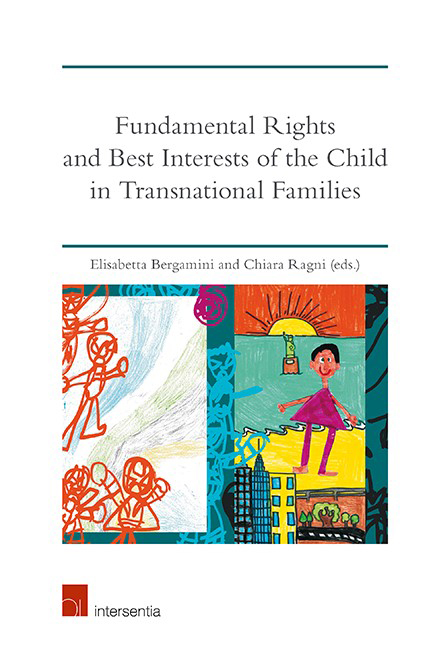Book contents
- Frontmatter
- Dedication
- Preface
- Acknowledgements
- Contents
- List of Cases
- List of Authors
- PART I THE IMPACT OF HUMAN RIGHTS AND OF THE BEST INTERESTS OF THE CHILD ON EU FREE MOVEMENT AND MIGRATION LAW
- Human Rights of Children in the EU Context: Impact on National Family Law
- Protecting EU Citizen Minors' Right to Identity in the Transnational Family Context
- The Best Interests Principle's Impact on Decisions Concerning Asylum-Seeking and Refugee Children
- Human Rights and the Best Interests of the Child in European Family Reunification Law
- Rainbow Families and EU Free Movement Law
- Kafala and Family Reunification of Third-Country Nationals
- Against a Girl's Will: Child Marriages, Immigration and the Directive on Family Reunification
- PART II THE BEST INTERESTS OF THE CHILD AS A CONCERN OF HUMAN RIGHTS AND EUROPEAN PRIVATE INTERNATIONAL LAW
- Index
- About the Editors
Rainbow Families and EU Free Movement Law
from PART I - THE IMPACT OF HUMAN RIGHTS AND OF THE BEST INTERESTS OF THE CHILD ON EU FREE MOVEMENT AND MIGRATION LAW
Published online by Cambridge University Press: 12 November 2019
- Frontmatter
- Dedication
- Preface
- Acknowledgements
- Contents
- List of Cases
- List of Authors
- PART I THE IMPACT OF HUMAN RIGHTS AND OF THE BEST INTERESTS OF THE CHILD ON EU FREE MOVEMENT AND MIGRATION LAW
- Human Rights of Children in the EU Context: Impact on National Family Law
- Protecting EU Citizen Minors' Right to Identity in the Transnational Family Context
- The Best Interests Principle's Impact on Decisions Concerning Asylum-Seeking and Refugee Children
- Human Rights and the Best Interests of the Child in European Family Reunification Law
- Rainbow Families and EU Free Movement Law
- Kafala and Family Reunification of Third-Country Nationals
- Against a Girl's Will: Child Marriages, Immigration and the Directive on Family Reunification
- PART II THE BEST INTERESTS OF THE CHILD AS A CONCERN OF HUMAN RIGHTS AND EUROPEAN PRIVATE INTERNATIONAL LAW
- Index
- About the Editors
Summary
INTRODUCTION
This chapter examines the position of the children of rainbow families (i.e. families comprising a same-sex couple and their children) in cases where such families move between European Union (EU) Member States and include at least one EU citizen. Currently, a division exists in the EU between Member States that provide legal recognition to same-sex couples and to the parental linkage between such couples and their children and Member States that provide only limited or no legal recognition. When same-sex couples move with their children from a Member State where they are fully legally recognised as a family to a Member State that refuses to afford full (or any) recognition, this is problematic from several perspectives. The free movement and fundamental (human) rights that both children and their parents enjoy under EU law are clearly affected when recognition is refused. This chapter explores whether EU law can assist the children of rainbow families when they seek legal recognition in a host Member State as children of both their parents under EU law.
LEGAL RECOGNITION OF RAINBOW FAMILIES IN EU MEMBER STATES: THE CURRENT SITUATION
The ‘nuclear family’, comprising different-sex married spouses and their legitimate and biologically linked children, was never the only form of family that existed. However, until recently it has been the main form of family recognised under the law. Nonetheless, ‘the family’ is a flexible and adaptable unit. Recent years have seen an increase in ‘alternative families’, with many families now comprising (unmarried) cohabitants, children and their step-parents, children and their single parents, and children and their same-sex parents. Therefore, the law must not only recognise such alternative families, but also provide a system that is sensitive and responsive to their specific needs.
Same-sex couples are incapable of having children who will be biologically related to both members. Such couples can, however, become de facto parents in several ways, such as through donor insemination (known or anonymous), assisted conception, surrogacy, a prior opposite-sex relationship, or adoption. This means that in some situations, one of the members of the couple will be biologically connected to the child (e.g. when one of the female partners in a same-sex couple undergoes medically assisted insemination using her own egg or when the sperm of one of the male partners in a same-sex couple is used in a surrogacy arrangement).
- Type
- Chapter
- Information
- Publisher: IntersentiaPrint publication year: 2019



